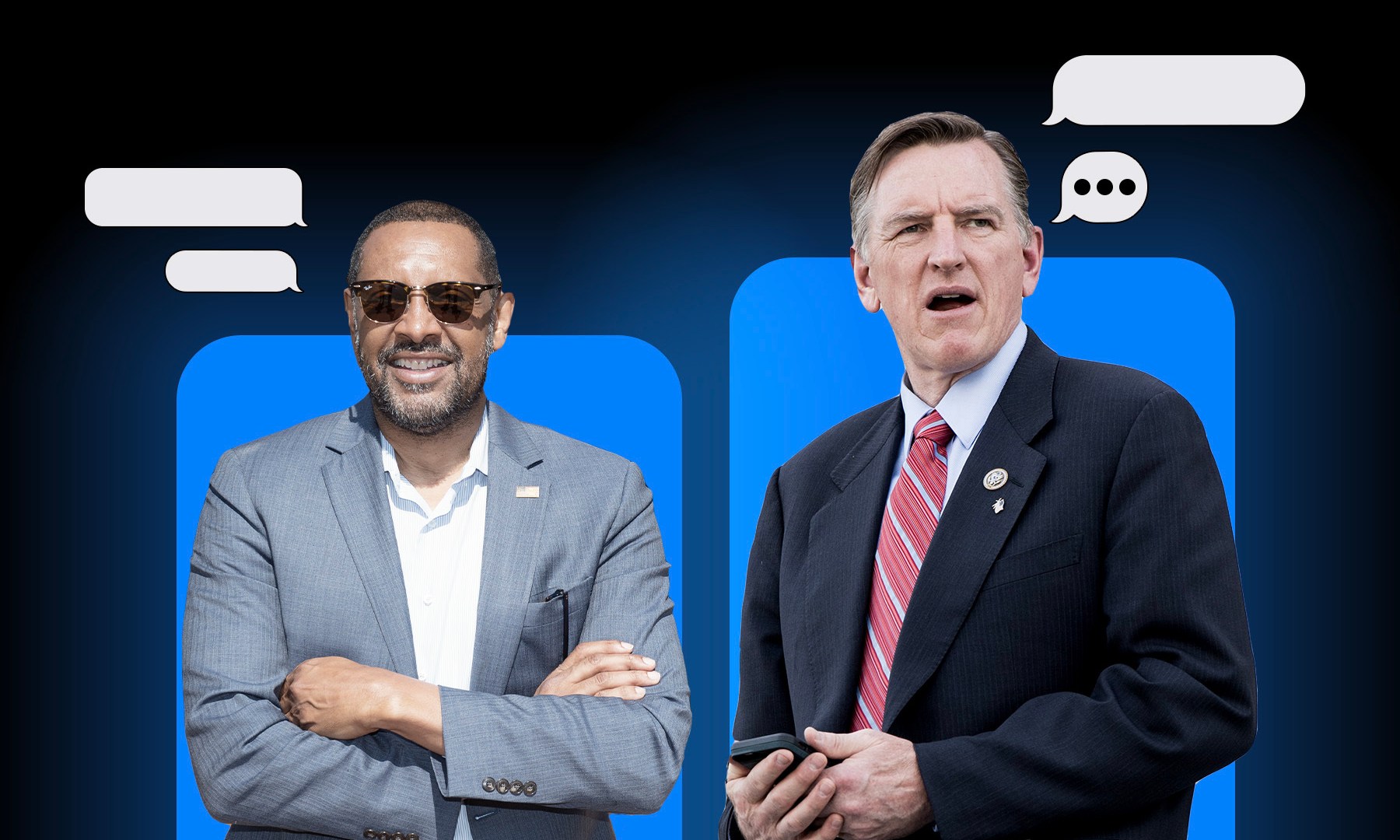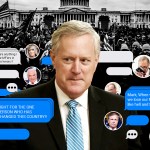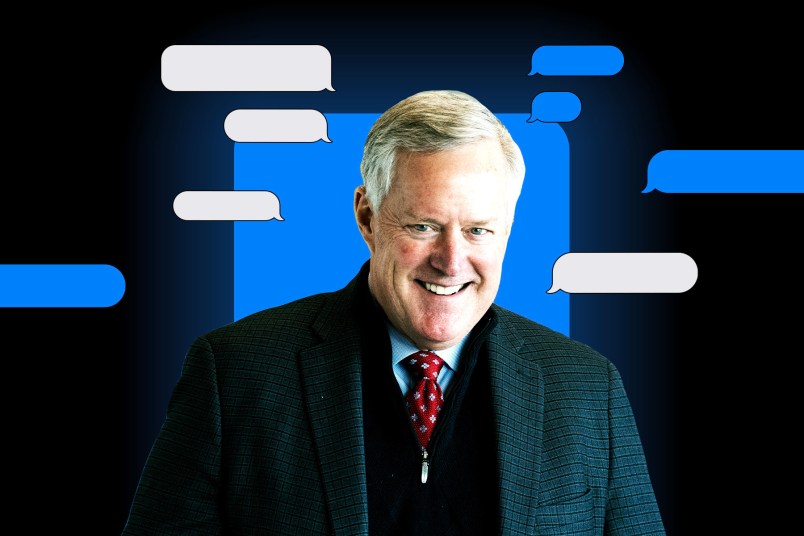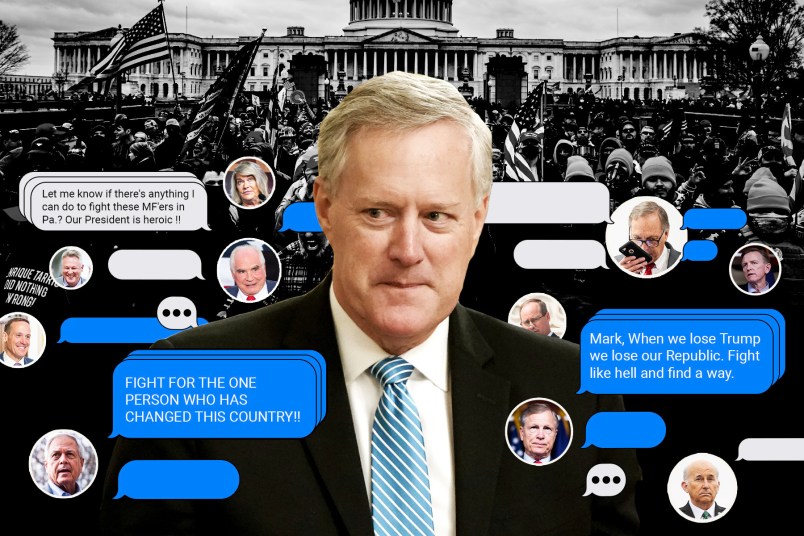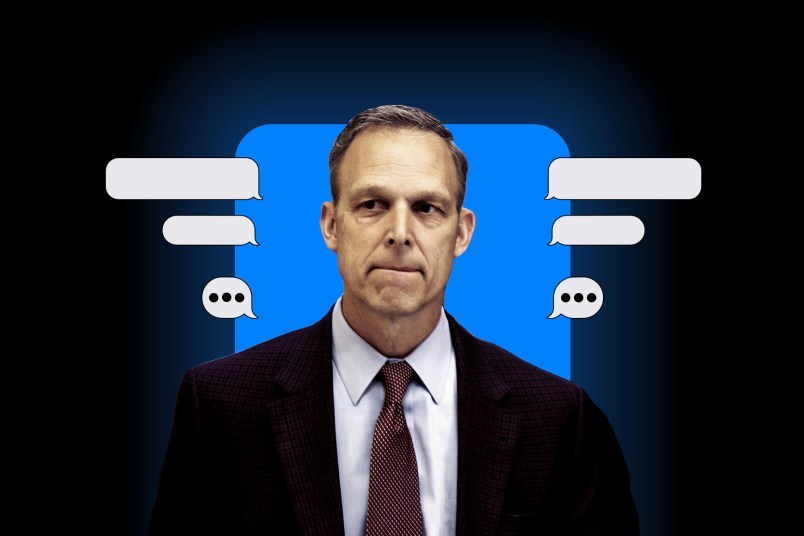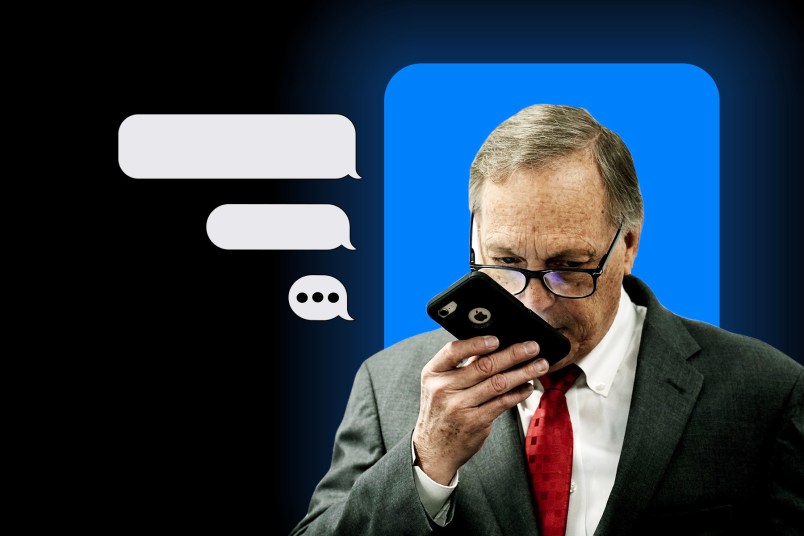The text messages Mark Meadows turned over to the House select committee investigating the Jan. 6 attack show how frantically former President Trump and his allies worked to reverse the results in the 2020 election. They also reveal how many members of Congress and other political allies were part of this chaotic push to overturn Trump’s loss. And, in at least four cases, the text messages show political allies explicitly mixed requests for presidential pardons with help on the election efforts that were so important to Trump.
At least three of those requests were subsequently granted by President Trump. They raise fresh, thorny legal and ethical questions about the manner in which Trump wielded pardon power to help allies during his final days in office. Experts who spoke with TPM described the texts as “corrupt” and examples of “venality” — though likely not criminal — because of the implied quid pro quo.
TPM has obtained the 2,319 text messages Meadows, who was Trump’s last White House chief of staff, provided to the committee. Those texts, which date from the period between Election Day on Nov. 3, 2020, and Jan. 20, 2021 when Trump left office, may not be the complete record of Meadows’ communications. For more information about the story behind the text log and our procedures for publishing the texts, read the introduction to this series. Three of the messages in which Trump allies requested pardons as they aided the push to overturn the election are being reported here for the first time.
The first pardon request in Meadows’ text log came from Rep. Rick Allen (R-GA) on Dec. 20, 2020. Allen was one of the Republican members of Congress who was most active behind the scenes in his efforts to challenge President Trump’s loss in the 2020 election. Allen exchanged at least 27 text messages with Meadows that were included in the log. Allen’s conversations with Meadows contained wild election fraud conspiracies and alleged information from a high-level “source.”
In one of the texts with Meadows, Allen sought a presidential pardon for an unnamed family friend who he suggested had faced a charge from an FBI investigation like Trump’s former national security adviser Michael Flynn. Trump pardoned Flynn, who was an active participant in efforts to overturn the 2020 election, in November of that year, weeks before Allen’s text to Meadows. In the next breath after bringing up his family friend, Allen touted the work his supposed “source” was doing to raise questions about Trump’s loss.
12/20/20 9:31 a.m.
Meadows’ text log does not contain a response from him to Allen’s message. Allen and his office have not responded to multiple requests for comment.
The next pardon request in Meadows’ log came from state Rep. Vernon Jones of Georgia,, a state that was a focal point for the Trump team’s election overturn efforts. Jones was in Washington, D.C., on Jan. 6, 2021, when protests against Trump’s loss turned violent. He appeared as an opening speaker at the White House Ellipse rally where Trump encouraged the crowd to “fight like hell” before many of them marched to the Capitol where the electoral certification was underway. The first barricades at the building were stormed as Trump spoke. Texts show Meadows helped Jones secure his speaking slot at that event where he announced he was switching his party affiliation from Democratic to Republican. Jones was also billed as a speaker at the “Wild Protest” that was scheduled to take place outside the Capitol that day before being scuttled amid the mayhem.
In a Dec. 22, 2020, text to Meadows, Jones referenced his plans to participate in the Jan. 6 protests as he requested a pair of pardons for two unnamed “law enforcement officers who were victims of the FBI & DOJ.”
12/22/20 7:06 p.m
In a statement to TPM, Jones defended the request.
“There is nothing illegal or improper to ask for a pardon. If it were, it wouldn’t be in the constitution,” Jones said.
Jones declined to say who it was he requested pardons for in his text to Meadows.
The next pardon request in Meadows’ text messages came from Rep. Ted Budd (R-NC) on Dec. 23, 2020. Budd, who was elected to the U.S. Senate last month, emphasized that he was among the Republicans who planned to object to the electoral certification as he lobbied for a pardon for someone he identified as “Robin H.”
12/23/20 8:26 p.m.
Budd’s message is possibly a reference to Robin Hayes, a former Republican North Carolina congressman who pleaded guilty to lying to the FBI in 2019 as part of an investigation into a bribery plot that the Charlotte Observer called one of the state’s “worst political corruption scandals.” Trump pardoned Hayes during the final hours of his presidency on Jan. 20, 2021. Budd did not respond to a request for comment.
Multiple experts who spoke with TPM saw Budd’s message as the most concerning of the pardon requests in Meadows’ text logs.
Brian Kalt, a law professor at Michigan State University, called Budd’s request “problematic.”
“There’s not a lot there but it sort of hints at some smoke. Maybe there’s some evidence of fire somewhere else,” said Kalt of Budd. “It sounds like he is sort of hinting at a quid pro quo.”
The pardon requests in Meadows’ text log “could technically fit the definition of bribery, which is the exchange of official action for something of value,” Albert Alschuler, a professor emeritus at the University of Chicago Law School who has worked at the Department of Justice, told TPM. Alschuler agreed that Budd’s message raised the most red flags, but stressed it was not something that was likely to provoke criminal charges.
“There are winks and it’s all over the place but a prosecutor wouldn’t approach them because it would be almost impossible to prosecute,” he said of the texts.
Rep. Paul Gosar (R-AZ) also appeared in the text logs seeking a pardon for an ex-member of Congress. Gosar’s lengthy message to Meadows, which was first reported in September, asked for Trump to pardon five different people. Gosar’s list began with Rep. Rick Renzi (R-AZ), who was convicted of corruption, money laundering and other charges in 2013. He then requested pardons for former Trump adviser Steve Bannon and other leaders of the We Build The Wall group who were facing fraud charges for allegedly misusing donor funds they raised to privately build a section of the wall Trump promised to erect on the border with Mexico. In Oct. 2021, Rolling Stone published a report citing two activists who worked with We Build The Wall, who claimed Gosar told them he was working on pardons for the group as he encouraged them to protest Trump’s election loss. Gosar issued a statement denying that report. Gosar’s text also included a request for a pardon for Ross Ulbricht, the founder of the dark web marketplace Silk Road, which facilitated sales for drugs, guns, and contract killings.
1/12/21 11:01 a.m.
Trump pardoned Renzi and Bannon in his final hours in office. He also reportedly considered a pardon for Ulbricht. He did not pardon Bannon’s We Build The Wall collaborators. According to testimony and other materials gathered by the select committee, Gosar is one of multiple members of Congress who pursued pardons for themselves for their efforts to overturn the election. Gosar has denied that accusation.
Anthony Foti, a spokesperson for Gosar, defended the request in an email to TPM.
“Congressman Gosar is on public record seeking a pardon for Stephen Bannon, Congressman Renzi and Brian Kolfage,” Foti wrote. “All requests were submitted to the office of the Pardon Attorney as well as discussed informally with the Trump White House.”
Alschuler, the former DOJ official, suggested there were clear concerns raised by Gosar’s request. However, he indicated it was carefully worded in such a way as to avoid real legal issues.
“It’s perfectly corrupt,” Alschuler said of Gosar’s text to Meadows. “The quid pro quo is all but explicit, but that’s probably enough to prevent prosecution.”
Kalt agreed. “Sometimes people text things that they shouldn’t. It does happen,” he said of the texts. “But the whole idea of the pardon power sort of lends itself to this kind of venality for lack of a better word,” Kalt said. “And I think it’s what’s on display here. You see it for what it is.”

